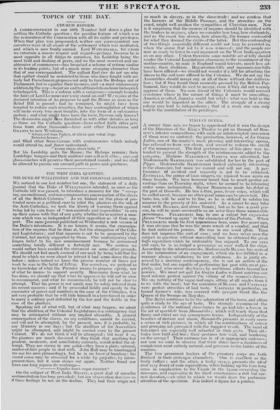THE WEST INDIA QUESTION.
THE DUKE OF WELLINGTON AND THE COLONIAL ASSEMBLIES.
WE noticed in our last number but one, the statement of a daily journal that the Duke of WELLINGTON intended, as soon as the Catholic bill was passed, to introduce a measure for the "sweep- ing, unconditional, and non-compensatory emancipation of the slaves of all the British Colonies." As we looked on this piece of pre- tended news as a political ruse to inlist the planters on the side of the Anti-Catholics, we took the liberty of warning them against being led by vain fears of "non-existents and impossibles" to mix up their cause with that of any party whether for or against a mea- sure which was as independent of their opposition as of their sup- port. The same journal published on Wednesday a new version of the Duke's intentions. It is no longer, it seems, the emancipa- tion of the negroes that he dims at, but the abrogation of the Colo- nial Legislatures ; and that measure is not to be proposed by the Cabinet, but merely supported by them. Our contemporary dial- lenges belief to his new announcement because he announced something totally different a fortnight ago. We confess we would rather have credited the statement on some other grounds. We should not feel much assured of our neck by being told that the steed to which we were about to intrust it had come down the day before ; unless indeed we knew the precise number of times per week he was in the habit of falling. For ourselves, we pretend to no knowledge of what the Prenner means to propose openly, nor of what he means to support secretly. Reasoning from what he has done, we should say that what he approves he will not be slow to recommend, and what he recommends he will not be slow to attempt. That his power is not small, may be safely inferred from his recent success ; and if he proceeded boldly and openly to the encounter of power and numbers in the case of the Catholics, it is not very probable that he will hide himself in a beer-barrel in order to carry a solitary post defended by the few and the feeble in the case of the planters. Speaking not of what will, but of what may happen, we admit that the abolition, of the Colonial Legislatures is a contingency that may he anticipated without any implied absurdity. A general emancipation of the slaves, on any conditions, cannot be carried, and will not he attempted, by the present, nor, it is probable, by any Ministry in our days ; but the abolition of the Assemblies might be attempted, and might be carried even by the present Cabinet. We do not think it will be attempted ; but. were it so, the planters are much deceived if they think that anything but prudent, moderate, and conciliatory counsels, would defeat the at- tempt. They are strong in one point—they have a plain, rational, matter-of-fact people to deal with. John Bull may be humbugged (to use his own phraseology), but he is no lover of humbug: his sound sense may be obscured for a while by prejudice, by misre- presentation, but it soon shines out again. .Neither fraud nor force can long repress its workhrs- " — Lxpellas ?orcâ usque recurret."
On the subject of West India Slavery, a great deal of maudlin sentimentalism has long prevailed ; but our observation deceives us if these feelings be not on the decline. They had their origin not so much in slavery, as in the slave-trade: and we confess that the horrors of the Middle Passage, and the atrocities on the coast, might well awaken the sympathies of Christian men. Nor is it surprising that the owners of negroes should be identified with the traders in nerroes, when we consider how long, how obstinately, and as the event has shown, how absurdly, the former contended for what they deemed the rilits of the latter. But this confounding of two things essentially different could not long be persisted in, when the cause that led to it w es removed ; and the people are now as ready to listen to cool argument on the West India question as on any other. Unless therefore some notable act of folly should render the Colonial Legislatures obnoxious to the resentment of the mother-country, no man in England would tolerate, much less ad- vocate, their abolition... Registration-bills and manumission-bills have been offered—we should not wonder if a bill for attaching the slaves to the soil were offered to the Colonies. We do not say the Assemblies should accept any or all of these without due delibera- tion ; but if they found them earnestly pressed by the British Par- liament, they would do well to accept, even if they did not warmly approve of them. No sane friend of the Colonists would counsel resistance where in the nature of things it must be unavailing. America revolted, Jamaica could but rebel : what was bold in the one would be impudent in the other. The struggle of a strong colony may lead to independence ; that of a weak one can only lead to the annihilation of its privileges.


















 Previous page
Previous page